Brazilian authorities are concerned about the growing number of reports of labor pressure in elections in companies in Brazil, a practice known as electoral harassment, even though they consider that, for now, it is not relevant to affect the democratic system.
Speaking to Lusa, the attorney general of the Brazilian Public Ministry of Labor (MPT), José de Lima Ramos Pereira, admitted that there is “concern” about this phenomenon but recalled that electoral harassment is not new and, in the 2018 election, the body recorded 212 complaints relating to 98 companies.
In recent weeks, the media and social networks have been disseminating videos and news about Brazilian business people pressuring employees to vote for candidates of their preference, sometimes even threatening them with dismissal.

“Right now, we’re at 320 reports, and there’s no repeat company yet, meaning the possibility that [the problem happened] in at least 300 companies, and it’s still two weeks before the second round of elections on October 30,” said MPT’s attorney general.
“The concern is that a volume [of complaints] comes on an upward trend.
“Every moment there are [reports and] new denunciations, but this also demonstrates that the population, in general, is well informed, that the ‘media’ is doing its role of dissemination and demonstrates that the institution [MPT] is prepared,” he added.
Electoral harassment is characterized by actions of coercion, intimidation, threat, humiliation, and embarrassment to influence the vote of employees by companies and business people, or even favoritism actions, that is, when workers receive proposals of financial rewards to vote for specific candidates.
Asked if this practice offers any risk to democracy in Brazil, already put into question by the political polarization that divides the country, Lima Ramos Pereira emphatically denied and argued that “Brazilian democracy is solid and has institutions that protect it, and therefore at no time is any normalcy at risk.”
“The Brazilian State is much bigger than the people, and we are all prepared for any situation”. The “Brazilian State will allow, through its institutions, that there is no kind of risk, even minimal, to democracy,” he pointed out.
The MPT has already officially registered 447 cases of electoral harassment, according to data released by the agency’s communication department.
Most of the complaints occurred in companies in the south and southeast of the country, more industrialized regions where the Brazilian President, Jair Bolsonaro, has significant support from the business sector.
An example that became public recently happened at Altenburg, a textile giant and the largest pillow producer in Latin America, which received a recommendation from the MPT of Santa Catarina, in the southern region, to refrain from forcing or inducing workers to direct votes in the second round of the presidential elections.
The body received complaints that employees were being coerced into voting for Bolsonaro under the threat that the maintenance of their jobs depended on the re-election of the ruler.
In one of the videos of electoral harassment to which the report had access, businessman Marcelo Dominici of the Terra Boa group, of which the Rio Grande do Sul-based agricultural machinery and equipment company Stara is a part, appears surrounded by employees, speaking about alleged threats of communism and pressuring them to vote for Bolsonaro.
On recordings exposing this type of situation, the attorney general of the Labor Prosecutor’s Office commented that he was struck by the trivialization of this practice in 2022.
“It is as if [electoral harassment] is inserted in the employment contract, that it is normal for the employer to have this kind of attitude, which it is not. It seems people have lost a little modesty,” Lima Ramos Pereira pondered.
“Generally, harassment is practiced invisibly, hidden, because people don’t want to incriminate themselves.
“To our surprise, companies and people are not worried if they are recorded; if this goes to the social network (…), this is a trivialization of the illicit act,” he added.
The MPT of Rio Grande do Sul filed a civil suit against Stara seeking compensation of 10 million reais (1.9 million euros) after detecting that the company had already sent a document to its suppliers claiming that it would have to reduce its budget if Lula da Silva is elected President.
The body claimed that this complaint “has no political or partisan nature, but to defend the Federal Constitution, ensure freedom of political orientation and vote for workers, safeguarding the right to exercise full citizenship.”
Asked if he was aware of allegations against companies or business people favoring Lula da Silva since the report could not find any information in this regard, the Attorney General refrained from answering and explained that for the MPT, it does not matter who would be the favored or harmed candidate, but rather the guarantee of workers’ rights.
“It doesn’t matter to the Labor Prosecutor’s Office whether it is one candidate or another. What matters is that the worker’s right to vote is respected at the moment of work,” he pointed out.
“We would have to analyze case by case and open each procedure to make this count. But as this does not concern us, we only refer it to the Electoral Public Ministry because this body can investigate another type of illicit act,” he concluded.
With information from Lusa

